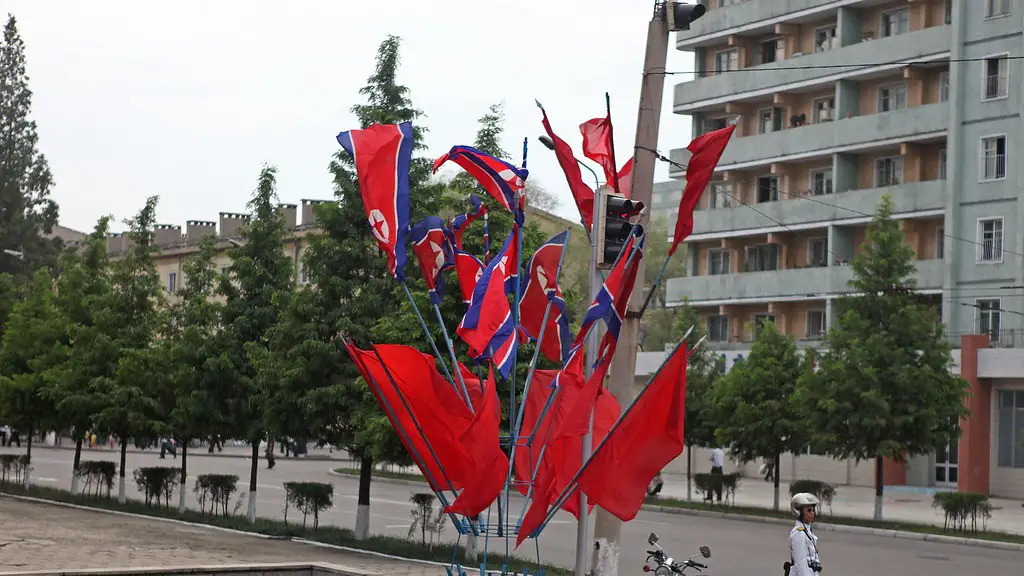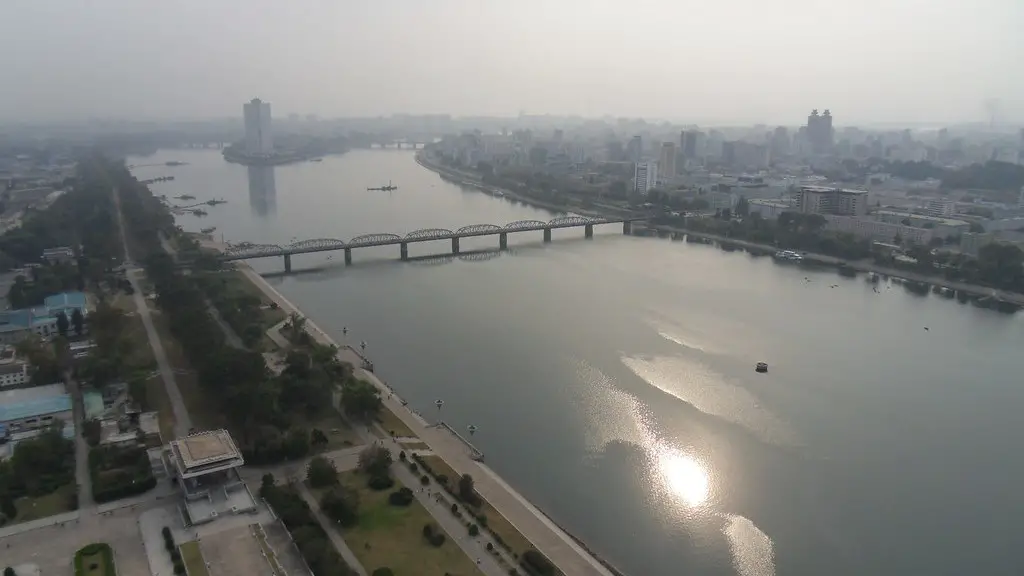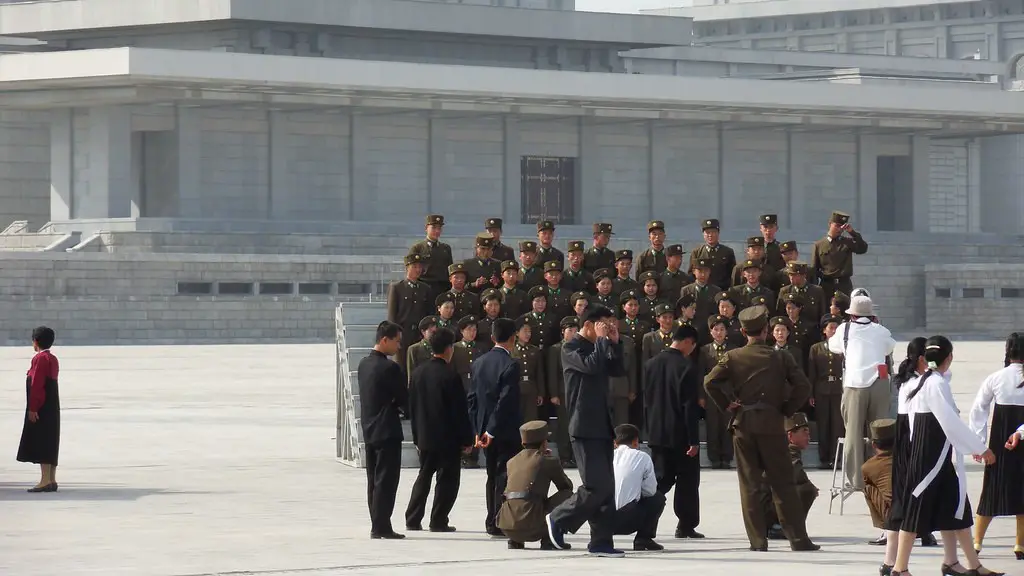North Korean Regime
North Korea has been an oppressive and largely isolated state since the end of the Korean War. Since then, it has operated under the rule of the Kim dynasty — a family that has been characterized by dictatorship, hierarchy and suppression of dissent. The current ruler, Kim Jong Un, has proven particularly hostile to the United States, sparking antagonism between the two countries.
The United States has always held a somewhat tense relationship with North Korea. This tension was heightened in the 1990s and 2000s, when North Korea engaged in large scale nuclear weapons testing and the United States threatened to use military force to prevent the spread of nuclear weapons to other countries. The United States has also criticized North Korea for its poor human rights record and its brutal suppression of dissent.
Despite years of antagonism and threats of war, the US-North Korean relationship remains in a delicate state. The United States is still trying to ensure that North Korea does not acquire nuclear weapons and build a ballistic missile capability. Although US attempts at dialogue and negotiations have yielded few tangible results, these efforts have been credited with limiting the scope of North Korea’s nuclear program and keeping the world from the brink of nuclear war. The United States has also provided humanitarian aid to North Korea despite its limited ability to influence North Korea’s internal affairs.
North Korea and the International Political Landscape
North Korea stands to benefit from its hostility to the United States, as its aggressive posture can be used to divert attention away from its domestic problems. In addition, North Korea’s rhetoric is a means of alleviating pressure from other countries, including China. North Korea can use its threats against the United States to deflect China’s increasingly vocal criticism over its human rights record, while also serving as a bargaining chip in negotiations over economic aid from other countries.
In the current global political climate, North Korea’s constant threats against the US also make it a convenient target for other countries seeking to sabotage US attempts to consolidate power in the region. As the United States pursues its own geopolitical goals, countries like China, Japan and South Korea have sought to create strategic alliances that help contain the US’s aspirations. By maintaining its hostility towards the United States, North Korea reinforces these other countries’ efforts to maintain their own power and influence.
In addition, North Korea’s nuclear weapons program has become a bargaining chip in global politics, as countries like Russia, China and even the United States use it as an avenue to gain leverage over one another. North Korea’s Nuclear program is viewed as a bargaining chip simply because it is the only nuclear power in the region and its weapons can easily be used to threaten its neighbors. North Korea has also got the attention of countries like Japan and South Korea, which have become increasingly worried about their own security in the face of North Korea’s aggressive posturing.
US Sanctions on North Korea
The United States has imposed a wide range of sanctions on North Korea to try and force the nation to abandon its nuclear program and engage in constructive dialogue. These sanctions range from financial and trade-related measures to military restrictions. The US also actively works to create international coalitions to enact secondary sanctions on countries that violate UN-imposed sanctions on North Korea.
The US has also used diplomatic appeals and “talks” with North Korean officials to try and improve the situation. The Trump administration has consistently sought dialogue with North Korea and its top officials, although it has yet to yield any significant progress towards reaching an agreement on security issues.
The US has also leveraged its extensive military presence in the region to strongly discourage North Korean aggression. The US has moved to expand its military presence in South Korea and Japan, stationing permanent military forces in the area to better monitor developments in North Korea and provide a deterrence against possible aggression. The United States has also taken steps to impose an embargo on North Korean ships, and to create a maritime interdiction force to stop the flow of illicit traffic from North Korea.
Kim Jong Un’s Nuclear and Missile Proliferation
Kim Jong Un, North Korea’s current leader, has expanded North Korea’s missile and nuclear capabilities to levels not seen before in previous North Korean regimes. North Korean nuclear and ballistic missile tests have shown significant progress in recent years. In 2017, North Korea tested two intercontinental ballistic missiles that could potentially reach high-value targets in the United States.
These actions have been met with strong condemnation from the international community, including the United Nations security Council, who have implemented several rounds of economic sanctions against North Korea. Additionally, the United States has engaged in a “maximum pressure” campaign that has included forced nuclear inspections, asset freezes and travel restrictions.
Kim Jong Un has so far refused to budge to these types of threats and has continued to expand his country’s nuclear arsenal, including by improving his capability to deliver nuclear weapons to regional targets. Kim Jong Un’s tireless pursuit of a nuclear arsenal has been cause for much concern, both in the region and beyond, as it puts the stability of the entire region in jeopardy.
North Korea’s Uncertain Future
North Korea remains an unpredictable and dangerous country. Its leaders are unwilling to compromise on their nuclear ambitions and explain their hostility towards the United States. It is difficult to tell what will happen in the future, though there are signs the United States and North Korea could be on the brink of coming to a negotiated peace.
In addition to these direct interactions, there are regional and global efforts to find a peaceful resolution to the US-North Korea conflict. Countries like China and Japan are looking for ways to contain and deter North Korea from further expanding its nuclear arsenal. South Korea, too, is pursuing a more aggressive policy towards its northern neighbor, seeking both economic and diplomatic agreements in order to stabilize the situation.
The international community has also called on North Korea to de-escalate the situation and act responsibly. They have urged the country to engage in dialogue and participate in meaningful negotiations. This, they say, is the only way to achieve long-term peace and security in the region.
North Korea’s Response to US Action
North Korea’s response to US action has largely been one of defiance. North Korean officials have repeatedly warned the US not to push it too far, and insist that its nuclear weapons program is purely defensive in nature. North Korea’s representatives have also rejected US demands for them to completely dismantle their nuclear program, claiming their nuclear weapons are the only way to protect their sovereignty.
Additionally, North Korea has demonstrated its willingness to engage in violence against US assets in the region. It has launched missiles over Japan, increased its level of naval activity near the US-Japanese joint military exercises, and conducted a series of cyber attacks against US forces and allies. As a result, US-North Korean tensions have escalated dramatically, placing the region in a precarious situation.
The United States has responded to North Korea’s actions by increasing its military presence in the region and by imposing more sanctions on North Korea. The US has also called on countries like China and Russia to increase their pressure on North Korea, and to use their diplomatic influence to convince North Korea to de-escalate its rhetoric and act more responsibly.
North Korean-US Relations – The Road Ahead
It remains unclear what the future holds for North Korean-US relations. There have been promising signs of progress lately, as North Korea has made some gestures of goodwill towards the United States. For instance, North Korea allowed US citizens to travel to the country for tourist purposes and proposed to postpone its annual military exercises.
However, it is still unclear whether these gestures are merely a stalling tactic or a sincere effort towards peace. Until North Korea takes concrete steps to assure the international community of its intentions, the future of North Korea-US relations remains uncertain.
The United States has consistently sought to pressure North Korea into making meaningful concessions, but so far its efforts have been unsuccessful. The US continues to press for the complete dismantlement of North Korea’s nuclear program, while insisting that the country take substantial steps to improve its human rights record.
Only time will tell how the North Korean-US relationship will develop. In the meantime, the international community must remain vigilant in its efforts to ensure that North Korea is held accountable for its actions, and that its threats of aggression are addressed in a meaningful and peaceful way.





